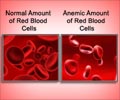An oral iron formulation instead of intravenous iron may be a safe and effective treatment for anemia in patients with chronic kidney disease.
Highlights
- Oral ferric citrate increased hemoglobin levels in patients with chronic kidney disease.
- The treatment was effective in correcting anemia within 2 weeks of initiation.
- Diarrhea and constipation were the common adverse events but was manageable.
Iron is an essential component that produces healthy red blood cells. Iron and oxygen make up hemoglobin, which is the part of the red blood cells that carries oxygen. Ensuring enough iron in the body helps correct anemia.
How does anemia strike in CKD?
Erythropoietin (EPO), a hormone produced by the kidneys that prompt the bone marrow to synthesize red blood cells. In CKD, the kidneys are unable to produce EPO and so the bone marrow makes fewer red blood cells, causing anemia. The body is deprived of oxygen when the red blood cell count goes down.The other common causes of anemia in people with kidney disease include blood loss from hemodialysis and low levels of iron, vitamin B12 and folic in the diet. These nutrients are required for the red blood cells to make hemoglobin, the main oxygen-carrying protein in the red blood cells.
How to treat Anemia in CKD?
The only treatment approved by the US Food and Drug Administration for iron deficiency are intravenous formulations of iron. These formulations carry certain risks including anaphylaxis or allergic reaction. The allergy might be skin rash, nausea, vomiting, difficulty in breathing or shock.Exposure to intravenous iron, as compared with oral iron, increased the frequency of serious adverse events, including cardiovascular events and hospitalization-requiring infections.
Can Oral Iron Intake treat Anemia in CKD?
The use of oral or intravenous iron to correct anemia in CKD is an ongoing debate. A study published the Journal of the American Society of Nephrology points out an alternative to intravenous iron.Glenn Chertow, MD, MPH, Stanford University School of Medicine and his colleagues conducted a study to test whether an oral iron formulation called ferric citrate might be a safe and effective alternative.
In a double blind clinical trial, 117 patients received oral ferric citrate and 115 received placebo. During a 16-week randomized period, 52.1% of patients receiving ferric citrate achieved a 1.0-g/dl increase in hemoglobin (a reflection of red blood cell counts).
The effect of the treatment was seen as early as 1-2 weeks after the start of treatment, and the response was durable. There were some common adverse events including diarrhea and constipation in the ferric citrate (12.0%) and placebo groups (11.2%).
"Secondary endpoints related to correction of anemia and lowering of serum phosphate were also reached in ferric citrate-treated patients. In addition, exploratory endpoints showed improvements in other parameters of mineral metabolism in ferric citrate-treated patients," said Dr. Chertow.
In addition to affecting iron levels, ferric citrate also functions as an intestinal phosphate binder and has been approved for the treatment of hyperphosphatemia in patients on dialysis.
Dr. Chertow noted that although oral ferric citrate boosted hemoglobin levels in the study, additional research is needed to see if the drug prolongs life or improves patients' quality of life.
References:
- Steven Fishbane, Geoffrey A. Block, Lisa Loram, John Neylan, Pablo E. Pergola, Katrin Uhlig and Glenn M. Chertow. "Effects of ferric citrate in patients with non-dialysis-dependent-chronic kidney disease and iron-deficiency anemia." Journal of the American Society of Nephrology (2016). DOI: 10.1681/ASN.2016101053
- Iron therapy for renal anemia: how much needed, how much harmful? - (https://www.ncbi.nlm.nih.gov/pmc/articles/PMC1805051/)
- Iron and Chronic Kidney Disease: What you need to know - (https://www.kidney.org/sites/default/files/docs/11-10-0284_patbro_irondeficiency.pdf)
- Oral or intravenous iron for anemia correction in chronic kidney disease? - (http://www.kidney-international.org/article/S2157-1716(15)32256-5/pdf)
- Anemia in Chronic Kidney Disease - (https://www.niddk.nih.gov/health-information/kidney-disease/chronic-kidney-disease-ckd/anemia)
Source-Medindia
















